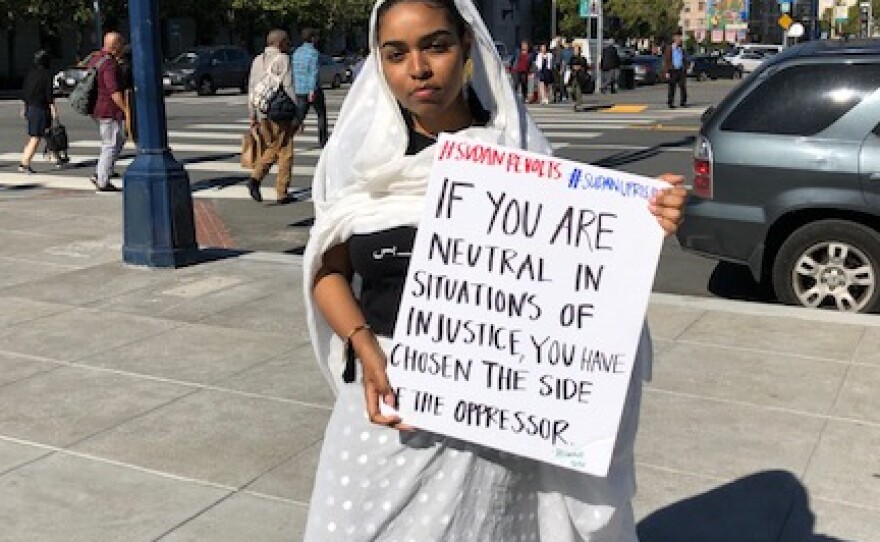On Tuesday, around 40 people gathered on the steps of San Francisco City Hall in a demonstration protesting the Sudanese military’s brutal crackdown on peaceful protesters on June 3. The demonstrators had been camping out at a sit-in in the capital, Khartoum, since April, following a four-month revolt that toppled former 30-year dictator, Omar al-Bashir.
Militiamen stormed the sit-in, burning the camps and using batons and live ammunition to disperse the multi-block campsite complex. The Central Committee of Sudan Doctors puts the number of dead at more than 100, with more than 650 wounded, according to protest organizers. Reports from Khartoum said the armed Rapid Defense Forces, also known as the Janjaweed, are controlling the streets of Khartoum — combing neighborhood alleyways and bringing the city to a standstill, with most residents taking cover in their homes. The ruling Transitional Military Council has shut down internet service, and Bay Area Sudanese have been scrambling to try and get in touch with family back home.
So, on what was supposed to be a day of celebration of Eid al-Fitr, the Muslim holiday marking the end of the fasting month of Ramadan, local Sudanese Americans were mourning and worrying, glued to their TVs and phones, desperate for any news coming out of Sudan.
After Eid morning prayers, a group of about 40 Sudanese met at San Francisco City Hall, with protest signs and flags, to take a stand. Shadin Awad, a 25-year-old from Fremont, was there, she says, to bring attention to the massacre. For her and her family, it’s personal. A close family friend, Mohamed Hashim Matar, was killed in the attack.
“He was young and hopeful, like the thousands of young men and women who wowed the world with this revolution. We have to spread awareness about what happened,” she said. “People in office need to know and take action.”
Her hope is that the U.S. will put pressure on the Sudanese Transitional Military Council to hasten the handover of the government to civilians. So far, the U.S. has condemned the attack and called on the Council to end the violence. But the group gathered at City Hall wants more than a condemnation.
Sudanese Association of Northern California member Amel Mohamed of San Ramon took that message across the street along with Shadin, and delivered a memorandum on the Sudan situation to the office of Congresswoman Nancy Pelosi. They marched from City Hall to the Federal Building and were met by Pelosi’s field representative, David Latt, who promised to pass the message on to the Congresswoman.
“We have to be taken seriously,” Shadin said. “Our representatives need to understand we are their constituents, we’re part of this community, we vote, and we have the right to be heard.”
For them, it was important to remind Americans that the armed group that conducted the June 3 bloody crackdown was the same Janjaweed militia so many Americans rallied against back in the 2003 Darfur crisis. Furthermore, Amel Mohamed stressed, “They need to understand also that these militias may destabilize not only Sudan but the entire region,” she said.
Makki M. Makky from Hayward rallied the youth involvement, leading chants and talking to the younger people in the crowd about the importance of being engaged as the next generation of Sudanese American youth. He said, "It's important they understand what it means to support our people back home, to organize and inform the American public about what's going on."
Donning a traditional white tobe, the flowing cotton body wrap worn by Sudanese women, 22-year-old Lina Abdelsalam made the trip to San Francisco after morning prayers in a Santa Clara mosque. She said it just didn’t feel like Eid. She carried posters with messages including the hashtags she wants people to follow on social media, like #SudanUprising and #SudanRevolts.
“We were chanting in English,” she said. “Usually the chants are in Arabic, but we wanted passers-by to understand. We wanted them to stop and ask us what’s going on. And they did.”
In fact, NAACP-SF president Dr. Amos Brown happened to be walking out of City Hall and stopped to talk to the group, expressing support and solidarity, and inviting them to come to Juneteenth at the 3rd Baptist Church in San Francisco this month to talk to his congregants.
“That was important,” Abdelsalam said. “He told us he visited Sudan in the '60s, he’s been to Africa 22 times, and that our struggles as marginalized Black people are similar. We connected. We felt heard. That’s what we want.”
While friends and family back in Sudan live in digital isolation and the paralyzing fear of what’s to come, Abdelsalam says it’s up to people living outside Sudan to pressure the international community to act. For her and this group of Sudanese, they’re starting with San Francisco.
“With the internet blocked, their message can’t get across to the world,” she said. “That’s why it’s our job now to do that. We have the access, we have the privilege, so we will spread the word. It’s up to us now.”
****
This Saturday, local Sudanese musicians will perform at the Tunes of Sudanoutdoor concert, as part of the Yerba Buena Gardens Festival, at Yerba Buena Gardens from 1-3 p.m.




